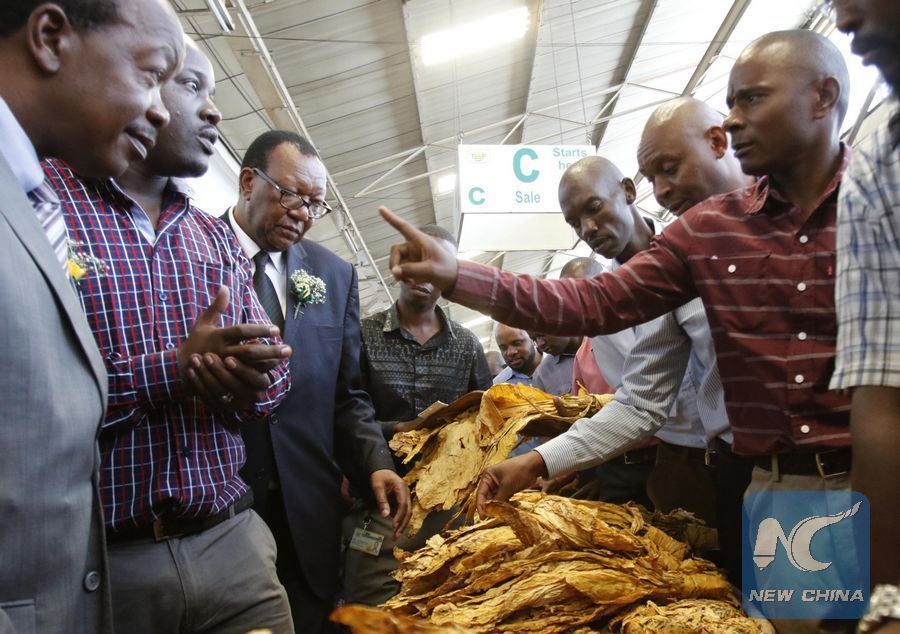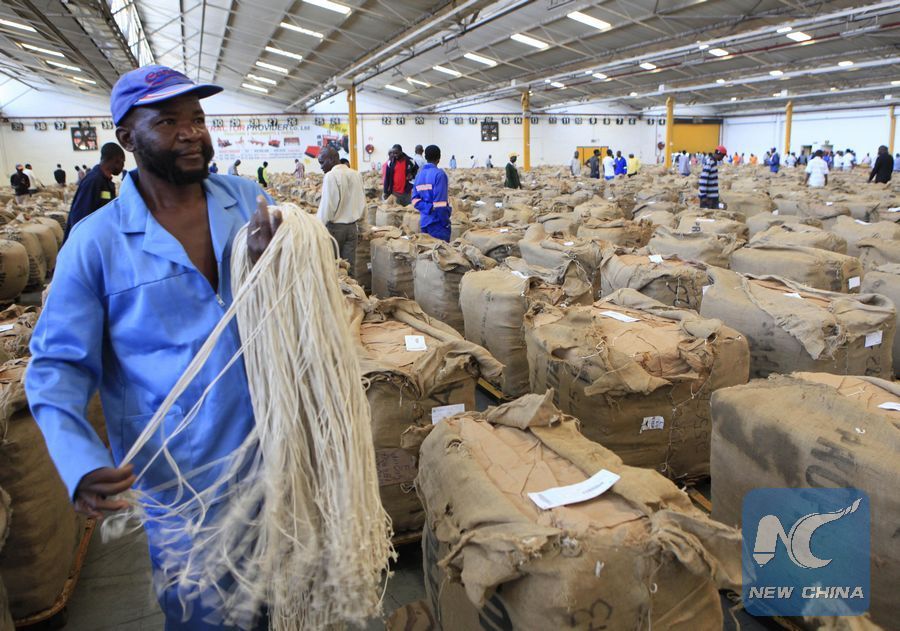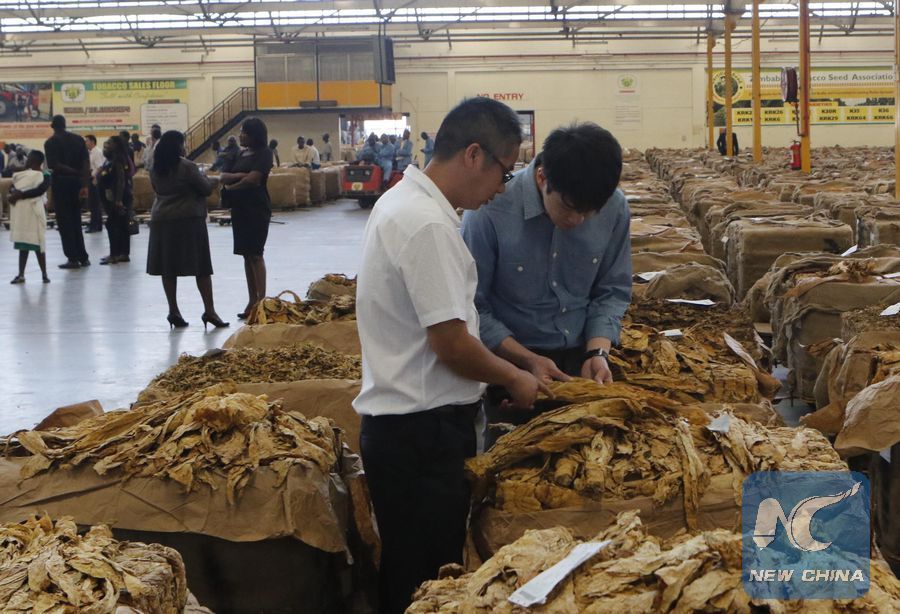A trading floor worker walks past bales of tobacco leaves as the 2016 sale season begins at the Tobacco Sales Floor in Harare, Zimbabwe, March 30, 2016. The output of tobacco, Zimbabwe's top export earner, is expected to fall by 15 percent to 160 million kg in 2016 after an El-Nino induced drought that has left up to four million people in need of food aid, officials estimate. (Xinhua/Stringer)
by Gretinah Machingura
HARARE, July 10 (Xinhua) -- Denford Mutwiwa, 54, is a successful new Zimbabwean farmer who has become the envy of many in his community.
A proud owner of a house in Harare's posh suburb of Borrowdale, Mutwiwa and his wife recently returned from a graduation ceremony of their daughter in the United States.
When he reflects, he is left in awe at the glamorous life he is now leading as a successful tobacco farmer.
"My wife and I grew up poor but my family life has since changed for the better through tobacco farming," he says.
"I used to feel marginalized as a black farmer but not anymore. I have grown to become one of the best tobacco farmers in the country through support from Tianze," he said.
Mutwiwa is among the country's tobacco farmers who are growing tobacco, the country's major foreign currency earner, with support from China's Tianze, a subsidiary of China Tobacco International, China's tobacco monopoly.

Traders inspect the packed tobacco leaves as the 2016 sale season begins at the Tobacco Sales Floor in Harare, Zimbabwe, March 30, 2016. (Xinhua/Stringer)
Having started with another contractor where he felt he was being exploited, Mutwiwa decided to switch to a new contractor, Tianze, in 2012, and his farming venture has recorded great success ever since.
"When I made the move to Tianze, it was like I had been freed as that very first year I ended the season with enough proceeds to deposit for a property here in town," said a proud Mutwiwa, who has extended his tobacco hectarage from 60ha to 200ha now.
Mutwiwa has managed to erect a new tunnel system with a corresponding shed, purchase four center pivots and four tractors, a 30 ton truck and extended his tunnel to 40 hectares.
He attributes his great success in tobacco farming in such a short period of time to the support he has received from Tianze.
Tianze started tobacco contract farming in Zimbabwe in 2005, with the sole purpose of helping to revive the country's tobacco output which had plummeted in the wake of the government's land reform program enforced in the early 2000s.
Close to 300,000 Zimbabweans were allocated land from the program, an exercise through which government repossessed white-owned farms for redistribution to the landless black majority.
Some of the beneficiaries of the land reform program such as Mutwiwa have ventured into tobacco production, and their farming endeavors have benefited greatly from the partnership with foreign tobacco companies.
Traders bargain while Zimbabwean Agriculture Minister Joseph Made (3rd L) inspects the tobacco leaves as the 2016 sale season begins at the Tobacco Sales Floor in Harare, Zimbabwe, March 30, 2016. (Xinhua/Stringer)
Tianze managed to arrange for inexperienced new farmers free interest loans, subsidized inputs and technical support, among other assistance.
Zimbabwe's tobacco output has rebounded and reached 217 million kg in 2014, slightly short of peak production of 231 million kg in 2001.
Every year, Zimbabwe exports almost half of its tobacco leafs to China, earning the much-needed foreign currency.
Tobacco leaf is Zimbabwe's top export earner, accounting for 10 percent of Gross Domestic Product and thus underlining its significance to the country's economy. The country raked in 855 million U.S. dollars from tobacco sales in 2015.
Tianze's successful tobacco contract farming story in Zimbabwe is shared by many growers.
Farmer Kelly Ruzvidzo, 46, who is growing 16 ha of tobacco under Tianze since 2008, says the firm has helped him to build five tunnels and acquire eight center pivots and 10 brand new tractors in such a short period of time.
"I have done this through the money they gave me to purchase all this at zero percent interest," he said.
Access to funding for agriculture by new black farmers in Zimbabwe is a major challenge as they lack security of tenure while the ongoing liquidity crunch has seen banks charging high interest rates that discourage borrowing.
"When we look at the success story of tobacco contract farming, the story will be incomplete without mentioning the record of Tianze Tobacco," said the company's managing director Ye Hai.
Ye said since its inception, the company had injected 40 million dollars annually in interest free loans towards Zimbabwean tobacco growers.
Another farmer Felix Kamusasa from Rusape became a contract farmer for Tianze in 2010. With 20 ha, over the past five years he succeeded in increasing the planting hectarage to 170.
"This system is flexible in that Tianze commits itself to seeing your crop through so much so that you pay back their granted loan. This comes through continuous checkups on production levels and standards and offering backups when crisis arises," he said.



